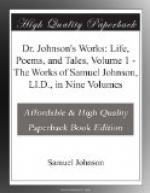“The tragedy of Irene,” says Mr. Murphy, “is founded on a passage in Knolles’s History of the Turks;” an author highly commended in the Rambler, No. 122. An incident in the life of Mahomet the great, first emperor of the Turks, is the hinge, on which the fable is made to move. The substance of the story is shortly this:—In 1453, Mahomet laid siege to Constantinople, and, having reduced the place, became enamoured of a fair Greek, whose name was Irene. The sultan invited her to embrace the law of the prophet, and to grace his throne. Enraged at this intended marriage, the janizaries formed a conspiracy to dethrone the emperor. To avert the impending danger, Mahomet, in a full assembly of the grandees, “catching, with one hand,” as Knolles relates it, “the fair Greek by the hair of her head, and drawing his falchion with the other, he, at one blow, struck off her head, to the great terror of them all; and, having so done, said unto them, ’Now, by this, judge whether your emperor is able to bridle his affections or not[c].’” We are not unjust, we conceive, in affirming, that there is an interest kept alive in the plain and simple narrative of the old historian, which is lost in the declamatory tragedy of Johnson.
It is sufficient, for our present purpose, to confess that he has failed in this his only dramatic attempt; we shall endeavour, more fully, to show how he has failed, in our discussion of his powers as a critic. That they were not blinded to the defects of others, by his own inefficiency in dramatic composition, is fully proved by his judicious remarks on Cato, which was constructed on a plan similar to Irene: and the strongest censure, ever passed on this tragedy, was conveyed in Garrick’s application of Johnson’s own severe, but correct critique, on the wits of Charles, in whose works
“Declamation roar’d, while passion slept."[d]
“Addison speaks the language of poets,” says Johnson, in his preface to Shakespeare, “and Shakespeare of men. We find in Cato innumerable beauties, which enamour us of its author, but we see nothing that acquaints us with human sentiments, or human actions; we place it with the fairest and the noblest progeny which judgment propagates by conjunction with learning; but Othello is the vigorous and vivacious offspring of observation, impregnated by genius. Cato affords a splendid exhibition of artificial and fictitious manners, and delivers just and noble sentiments, in diction easy, elevated and harmonious; but its




